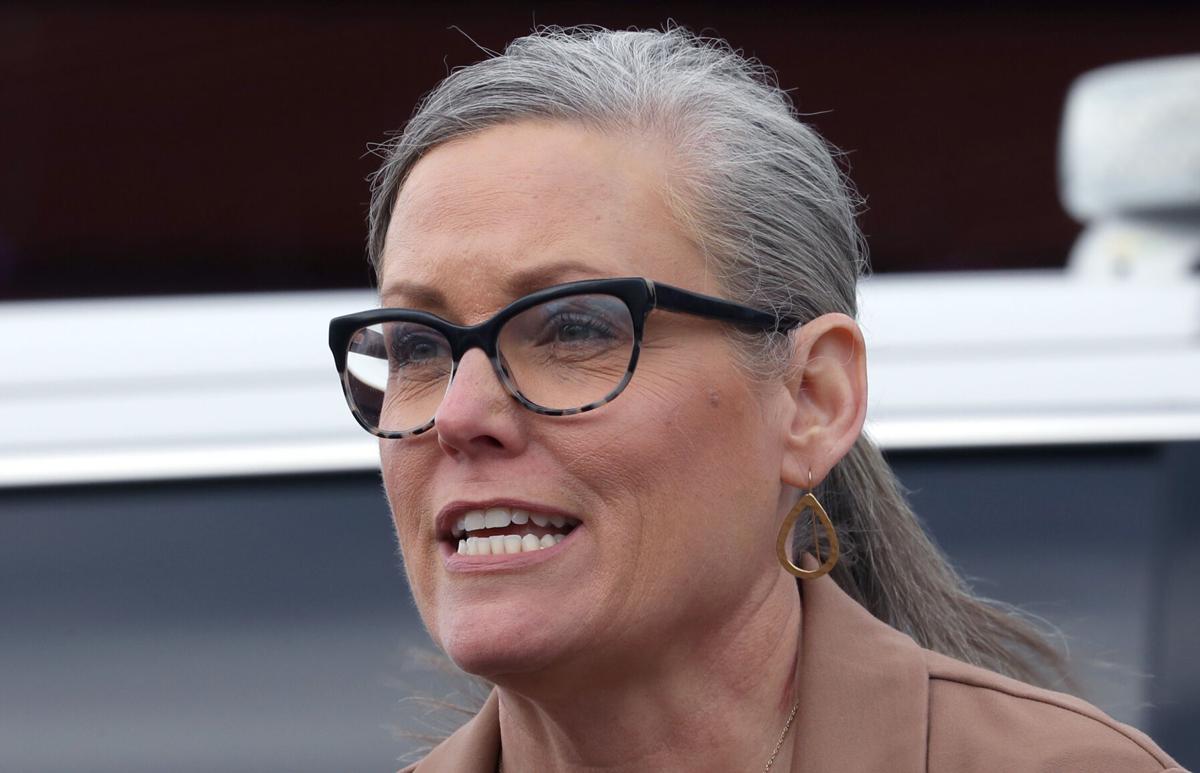PHOENIX — Gov. Katie Hobbs vetoed a bill aimed, its sponsor said, at preventing the filming of sex acts on public property. The governor called it “a thinly veiled effort to ban books.’’
It was one of a handful of measures the Democratic governor rejected Monday, bringing her veto total since January to more than 100. Others vetoed Monday include:
Prohibiting the state treasurer from investing in companies that donate to Planned Parenthood or other organizations that promote, facilitate or advocate abortions for minors;
Banning “ranked choice voting’’ or any form of balloting that has multiple stages of counting;
Increasing the number of people living in an area who would have to consent before the area could be annexed into an adjacent municipality.
Hobbs also nixed legislation designed to put some curbs on the use of aerial drones to photograph or observe people in private places. She questioned whether additional laws are needed and suggested the measure is overly broad.
“SB 1277 will negatively affect and restrict the important work of broadcasters, newspapers, telecommunications providers and insurance providers in Arizona,’’ Hobbs wrote. She said she is open to signing something worked out with all concerned.
Hobbs found particular fault with a proposal by Sen. Jake Hoffman, R-Queen Creek, prompted in part by an incident last year involving a teacher at Thunderbolt Middle School in Lake Havasu City.
The teacher and her husband, a fourth-grade teacher at another school, were discovered filming obscene videos in her classroom and posting them, for money, on a social media site, Havasu News reported. An email to parents from the school acknowledged that some students found the video online but said it had not been taped during the school day.
Hoffman’s bill sought to make it illegal to film or facilitate “sexually explicit acts’’ at any facility or property owned or leased by a public entity.
Sen. Priya Sundareshan, D-Tucson, said she presumed that already was against the law.
“Amazingly, it’s not,’’ Hoffman responded. “I don’t think anybody ever thought to have to believe that folks were going to use public facilities for porn-filming locations.’’
That part of the legislation appeared to have little opposition.
What did draw concerns was the other half, which said no state or local agency is allowed to expose minors to sexually explicit materials.
“I’m reading this, and I’m wondering, does this include a library that has a book with any sexual situation, even if it was in the adult section, just because a child could potentially find it on the shelf?’’ Sundareshan asked.
“It absolutely does include that,’’ Hoffman responded. He said he saw no reason not to combine both topics within the same legislation.
But Hoffman, in his criticism of Hobbs’ veto, focused almost exclusively on what happened at the Lake Havasu City school — and not the governor’s comment about him using that as an excuse to keep certain books away from children.
“It’s absolutely sickening that Katie Hobbs is allowing pornography to be filmed in our state’s taxpayer funded classrooms,’’ he said. “These should be safe spaces for our kids to learn in, not venues for the sexually explicit adult entertainment industry. No 12-year-old child should ever have to worry that their middle school desk was the location of a porn shoot.’’
Testimony on the bill was focused not on the filming but on the other section about which materials should be available to children.
Elijah Watson, who has testified on his own behalf on similar issues, said he understands the desire to protect children from sexually explicit materials. But he called the legislation “dangerously broad,’’ failing to provide adequate assumptions.
Consider, he said, examples of literature like “Beloved,’’ by Toni Morrison, which include memories of sexual abuse and exploitation. Then there’s “The Great Gatsby’’ with homoerotic language and “Of Mice and Men’’ which uses vulgarity and racist language.
Violations would have carried a presumptive term of 1.5 years in state prison, something Watson said should not be imposed on teachers for assigning a book.
Hoffman pointed out that lawmakers approved a similar measure last year that already makes it illegal to have sexually explicit materials in schools. This separate legislation sought to extend that to all other levels of government and their contractors, including libraries, he said.
Hobbs said all that goes too far.
“While I agree that not all content is appropriate for minors, this bill is a poor way to address those concerns,’’ she said in her veto message.
She took issue with Hoffman for trying to tie the issue of an incident at Lake Havasu City to further restricting access to reading materials.
“The sponsor has stated that this bill was aimed at preventing a specific action from reoccurring, while in reality it is written in such a vague manner that it serves as little more than a thinly veiled effort to ban books,’’ Hobbs wrote.
Banning certain books from libraries was just fine with other GOP lawmakers, however.
“I just want to challenge some of the members to get a hold of some of these books,’’ said Rep. Rachel Jones, R-Tucson.
“We have precinct committeemen in our district that have started sitting outside of libraries showing parents what is in the book,’’ she told colleagues. “My challenge would be to take one of these books, sit down with a 5-year-old, and read it to them.’’
Rep. John Gillette, R-Kingman, said he was prepared to bring in a book from his public library to read it out loud at the hearing.
“There was no possible way in the spirit of decorum we have here that I could read this book aloud, a book that was intended for sixth graders, to speak about sexual acts, with photographs,’’ he said.
Get your morning recap of today's local news and read the full stories here: http://tucne.ws/morning





